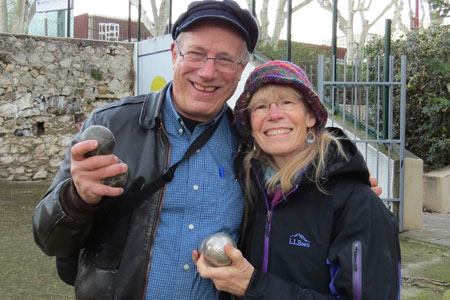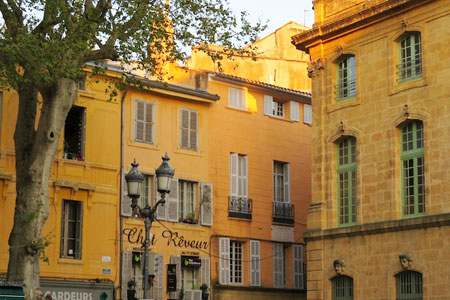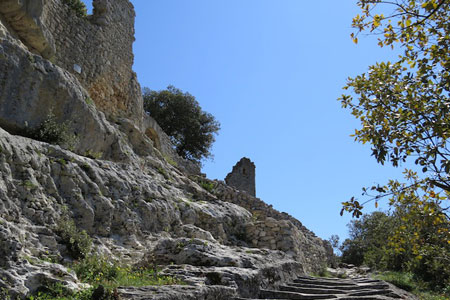Lanson delves into France, blogging

Jerry Lanson, associate professor of Journalism, and his wife, Kathy, after playing a game of petanque with classmates at a French language school in Aix. (Courtesy Photo)
Associate Professor Jerry Lanson of the Journalism Department has spent the better part of 2014 on sabbatical in the south of France—exploring back roads and out-of-the-way places, practicing French, and talking to small business owners—all to provide offbeat tips to travelers and to bring his blogging skills back to Emerson students.
Lanson is gaining a following with his France in the Slow Lane blog, which he built with the help of graduate student assistant Jared Bennett, MA ’14. His posts have been picked up by French News Online and Huffington Post Travel, and linked to The Provence Post and an expat site for bloggers around the world. The slice-of-life blog tackles travel, culture, and other topics that Lanson says are tied to “slow-lane” experiences, both as a state of mind and a sense of place and pace.

A town square in Aix-en-Provence, France. (Photo by Jerry Lanson)
Lanson, a longtime journalist, author, and a former editor at the San Jose Mercury News, is working with Assistant Professor Mark Leccese on a book about blogging. Lanson, who with his wife, Kathy, will stay in France until July, is heading off through back roads in eastern France in the coming weeks in search of small businesses that are finding a way to survive and sustain cultural traditions through innovation and adaptation to global competition.
What’s your favorite part about being in France?
Lanson: I love the French language, its cadence, its music, and some of the really crazy phrases that arise when people mistranslate. I love that French people of all ages like to look good. Women in particular don’t just dress; they wear costumes. They live with style. I love getting up daily and walking to town through what feels like a movie set, past buildings hundreds of years old, past moss-covered fountains. Daily life here is, in a sense, a walk through history. We walk daily through a park and pass a mansion built in the era of Louis XIV, the Sun King, for the mistress of an Aix duke.
What is the focus of your blog?
I chose the title France in the Slow Lane because my blog is about a kind of tourism that doesn’t just hit the high points, the big-name sights. The slow lane is both a type of travel and a state of mind (in part, in truth, because we haven’t always had a car). The blog is actually split into two sections: One is called “Letters from Provence.” It consists of musings on life here in Aix—on language, on changes in French culture, on bits and pieces of our daily experience. The other is called “Slow Lane Travel,” and it tends to draw in the most new readers. It’s a combination of little stories and travel tips—back-road places we’ve found such as Fort de Buoux, a medieval fortress in the wilderness, or the big bookstore, Le Bleuet, that’s struggling to survive in the little town of Banon. The travel tips tend to be more conventional travel writing. For example, the entry “12 Tips on How to Spend 6 Months in France Without Going Broke,” pulled in readers because it got a lot of interest on the Huffington Post travel site.

Fort Du Buoux, France, was once a medieval fortress and is now a rock climbing area. (Photo by Jerry Lanson)
How has blogging changed what today’s journalism students are learning?
When I went to journalism school in 1974 (yes, I’m a dinosaur), we were taught never to put “I” into a story. To sound neutral and authoritative, we, as young journalists, also too often drained voice and humor and passion from our work. Good blogs work in part because they establish the humanity of the writer and have a quality that ties that humanity to the reader. They do that by serving a specific audience.
How has your perception of blogging changed?
I used to think that blogging was about writing every day and being interesting. It’s more complicated than that. It’s more about vision; about filling a clear niche; about serving as a hub of blogs on that topic; about identifying, serving, and interacting with an audience. It is about writing with regularity, but posting every day is not necessarily the best measure of success.
Why did you choose to focus on France?
I chose France for two reasons. (A) The French are cussedly independent people with a great deal of pride in their culture. The vast majority of French business is small business. (B) We so enjoyed an earlier sabbatical in France that I wanted to return here to become more familiar with the culture, the language, and the people. That is a bigger challenge than I realized….At times, Americans think of the French as very much like us, perhaps just snobbier. But as the book Sixty Million Frenchmen Can’t Be Wrong (Nadeau & Barlow) makes clear, French culture and American culture are actually quite different. France isn’t the type of place where you invite your new neighbor over for a barbecue. Getting to know someone is a long, slow process. Reporting, perhaps because of these cultural differences, poses its own challenges. My French teacher [back in Boston] wrote to me in a sort of tongue-in-cheek way, “The Frenchies don’t answer email,” after a string of frustrations on my part in trying to get information. In France, the old reporting maxim “The best way to get someone is to show up” really does apply.
What are the pros and cons of blogging for aspiring journalists?
The potential benefits and dangers of blogging are sizeable for the young journalist. Blogging helps establish a voice, allows the writer to play with words, write more, and practice. Blogging also opens eyes. A student with a blog will get used to reporting as part of life rather than as a job. However, the potential dangers are also clear. A blog is a living document. If a young journalist is sloppy or opinionated or inaccurate, the blog is somewhat of a permanent record. Young journalists don’t know where their careers are going yet, and they don’t want to close doors by openly aligning themselves with a political party or opinion. I’d be quicker to encourage students to start a blog about something like “Great Walks Within 10 Minutes of MBTA Stops” as one of my travel writing students did last semester, than one that spouts off on local politics.
How does blogging tie into your classroom lessons?
To me, blogging is good journalism, if done well. It can provide information and be a conversation with the reader at the same time. It’s personal. It takes the reader “behind the scenes.” Its greatest value to the young journalist is the ability to find his or her voice. But there’s a big difference between voice and self-expression. Blogs in the classroom shouldn’t just be something students do. They need to be critiqued and edited like any other kind of journalism, and I do that.
What’s your favorite part of the France project?
That’s a hard question. Probably my favorite part is Kathy and I building this really exciting part of our lives together and sharing it with others. I also love the fact that I’m telling the story in significant part with photography. It’s a new love of mine and I’ll continue to pursue it seriously.
Categories